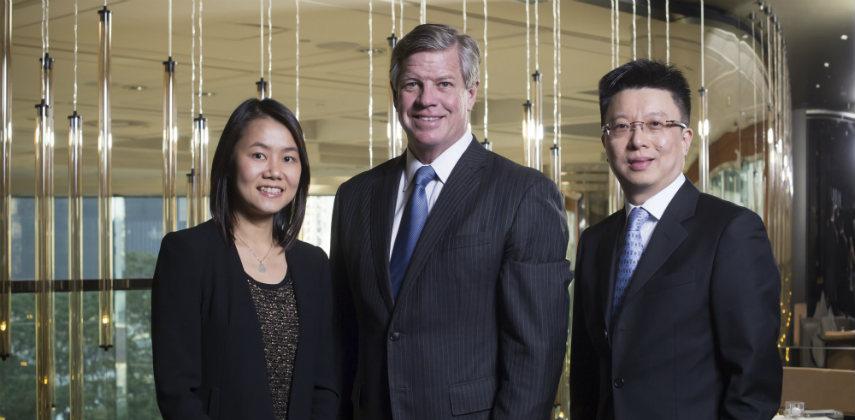HK hotel group’s family-friendly policies put its associates’ welfare first
Combining passion with care is the guiding principle behind the family-friendly policies at Marriott International. For 87 years, the hotel conglomerate has been putting these policies into practice by keeping its "associates" - the staff - at the core of its business values.
"There is a strong sense of caring that runs through the DNA of Marriott International," says Mark Conklin, general manager at JW Marriott Hotel Hong Kong, who has worked for the organisation for 34 years. "We care about people. We care about their growth, their families, and we care about them as individuals, as well as business associates. And they feel it."
The effectiveness of this policy has been recognised with Marriott International, Hong Kong, which includes six properties - the JW Marriott Hotel, Renaissance Harbour View Hotel, Hong Kong SkyCity Marriott, Courtyard by Marriott Shatin, Courtyard by Marriott Hong Kong and the Convention Plaza Apartments - being voted one of the four "Best Employers" to work for in Hong Kong and receiving the "Commitment to Engagement" award at the Aon Hewitt Best Employers Hong Kong 2015 awards.
In 1989, the JW Marriott Hotel Hong Kong was the first hotel under the Marriott International umbrella to be established in Asia. It became the group's flagship hotel and pioneered the five-day workweek in the city.
Conklin says the thinking behind the shift was for "you to take two days a week to pursue your personal interests … [to] be with your family and recharge. This has brought us competitive values. And, in fact, today there are a lot of other hotels that have not gone to a five-day work week [in Hong Kong], 26 years later."
Founder J Willard Marriott said when the business was established in 1927: "Take care of your employees and they'll take care of the guests."
Employees have since then been encouraged to pursue long-term growth and development, with increasing levels of responsibility, accountability and leadership. Over the years, the word "employee" was replaced with "associate". Instead of being viewed as subordinates working under senior management, staff are seen as equals who share in the success of the hotel.
Marriott International has always appreciated the importance of open dialogue between associates and their senior executives, Conklin says. Its "associate engagement action plan" ensures that feedback from every department is analysed and acted upon. "Our credibility as the management team, the leaders of the hotels, rests on us following up on their feedback and suggestions."
Measurements such as turnover and associates' engagement indexes provide snapshots of what works and what does not. As low turnover and high engagement generally correlates with guest satisfaction, positive financial results are the outcome.
"The reason we are all here is because we want to make our customers happy and for them to come back. That's our ultimate goal," says Sandra Ng, director of human resources at JW Marriott Hotel Hong Kong, who has been working for the organisation for 23 years. "It is important we get to know our customers. Each individual is different. The approach is up to the associate. We empower them to know the customers and find out what their needs are. We make the customers happy and they come back."
Last year's performance allowed associates from various Marriott brands to reap an annual bonus reward to be shared among all - just one of the benefits of working for a Marriott hotel.
Having worked in the group for 26 years, Gary Siu, cluster director of HR for Hong Kong, says associates get to learn from other Marriott brands in the city. With different target clientele, each brand has a unique style to connect with guests. A cross-hotel training programme enables associates to acquire new skills and brand knowledge. The programme also serves as a platform for associates to discuss and exchange the best practices of each brand.
Moreover, Siu says, associates continue to learn even after many years. Refresher programmes on company culture, business trends and brand education are conducted every year for all associates, while specialised training and online learning are also available. "When someone asks how people can work for our hotel for five, 10 or even 20 years, it's because they can see their opportunity for growth and their future within the company," he says.
More than 50 per cent of associates have worked for the group for more than five years. The training and development programmes, tailored to different tiers and needs of the organisation, are part of the attraction of working at Marriott hotels.
"It's a people business: people serving people," Ng says. "And consistency counts. You can't do it [just for] one day because you want to [win an] award - and once you've got it, you stop. Marriott has been doing it for 87 years. The consistency and being able to walk the talk count."
Conklin says that because Marriott has made a commitment to following this path, its staff turnover rate remains low. For example, the 2014 average turnover of the five Marriott hotels in Hong Kong was 30 per cent lower than the industry average.
For many associates, the benefits of working for a Marriott hotel lie not only in the monetary rewards and work culture, but in the personal growth and development opportunities.
"People get a lot of gratification out of serving others," Conklin says. "It's more than just a job for them; it becomes a passion. We call it the 'spirit to serve' - to make our communities a better place because of our presence and involvement. "


